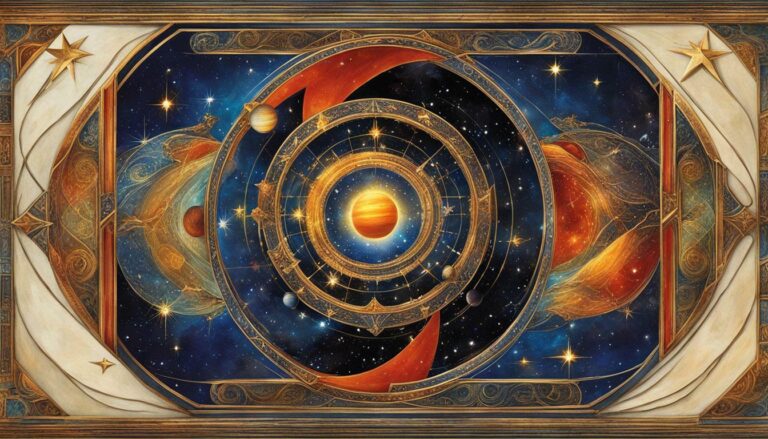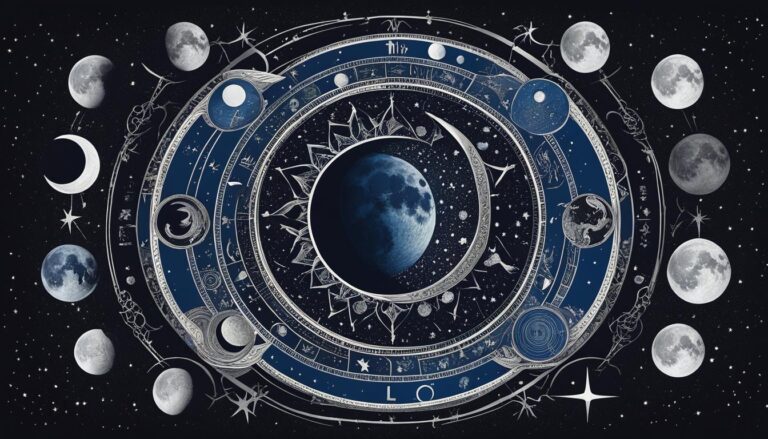What Is Kuja Yoga in Astrology?
Kuja Yoga, also known as Mangal Dosha or Kuja Dosha, is an astrological phenomenon that can have a significant impact on various aspects of your life, particularly in the context of marriage. It occurs when the planet Mars is unfavorably positioned in the 2nd, 4th, 7th, 8th, or 12th houses of your birth chart. Understanding the significance of Kuja Yoga in astrology is crucial for those seeking to navigate its effects and find remedies for a harmonious cosmic journey.
Key Takeaways:
- Kuja Yoga, also known as Kuja Dosha or Mangal Dosha, is an astrological phenomenon.
- It occurs when Mars is unfavorably positioned in specific houses of your birth chart.
- Kuja Yoga can have significant impacts on your life, particularly in the context of marriage.
- Understanding the signs and impacts of Kuja Dosha is crucial for navigating its challenges.
- Exploring remedies can help mitigate the negative effects and shape a more harmonious cosmic journey.
Understanding Kuja Dosha in Astrology
Kuja Dosha, also known as Mangal Dosha, is a significant astrological condition that occurs when the planet Mars is unfavorably placed in a person’s birth chart. Specifically, it affects the 2nd, 4th, 7th, 8th, or 12th houses. This dosha has a strong impact on marriage compatibility and can result in conflicts, constant quarrels, and even an abusive marriage.
The placement of Mars in the 7th house is particularly crucial as it often leads to serious problems and discord between partners. Understanding the implications of Kuja Dosha is essential for individuals who want to navigate its effects on their marital life effectively.
To gain a better understanding of Kuja Dosha, it is important to analyze the placement of Mars in different houses. When Mars is in the 2nd house, it can lead to constant family quarrels and miscommunication. In the 4th house, it can result in an aggressive and volatile domestic life. The 8th house placement can cause hardships, accidents, and problems with in-laws. Lastly, when Mars is in the 12th house, it can lead to bitterness, lack of trust, and potential divorce in marriages. Recognizing these signs and impacts is crucial for individuals affected by Kuja Dosha.
Key Points:
- Kuja Dosha is a condition that arises when Mars is unfavorably positioned in a person’s birth chart.
- It affects marriage compatibility and can result in conflicts and an abusive marriage.
- The placement of Mars in the 7th house is particularly important and can lead to serious problems between partners.
- Mars placement in different houses determines the specific impacts of Kuja Dosha.
- Understanding the signs and impacts of Kuja Dosha is essential for individuals affected by it.
Signs and Impacts of Kuja Dosha
The placement of Mars in the different houses of your birth chart determines the specific impacts of Kuja Dosha. Here are the signs and effects to look out for:
Mars in the 2nd House:
Constant quarrels and miscommunication in the family may arise, leading to tension and disharmony.
Mars in the 4th House:
An aggressive and volatile domestic life can be expected, which may result in frequent arguments and an unstable home environment.
Mars in the 7th House:
Disagreements and lack of harmony in your marriage or partnership are likely, and there may be a higher risk of separation or divorce.
Mars in the 8th House:
Hardships, accidents, and problems with in-laws could be experienced, potentially bringing additional challenges to your marital life.
Mars in the 12th House:
Bitterness, lack of trust, and even the possibility of divorce may arise, making it essential to address the imbalances caused by Kuja Dosha.
Recognizing these signs and impacts is crucial for individuals affected by Kuja Dosha, as it allows you to gain a deeper understanding of the challenges you may face in your relationships and take appropriate steps to mitigate its effects.
How to Identify Kuja Dosha
Identifying Kuja Dosha in astrology requires a thorough analysis of your birth chart. The placement of Mars in the different houses, particularly the 2nd, 4th, 7th, 8th, and 12th houses, is crucial in determining the presence and intensity of the dosha. A skilled astrologer will examine the planetary aspects, moon’s placement, transits, and progressions to gain a comprehensive understanding of the dosha’s effects on your life.
During the analysis, the astrologer will consider whether Mars is placed unfavorably in any of the mentioned houses. If Mars is present in any of these houses, it indicates the presence of Kuja Dosha. The intensity of the dosha can vary based on other factors in the birth chart, such as the strength of Mars, the presence of other benefic or malefic planets, and the overall balance of the chart.
It is important to consult an experienced astrologer for an accurate identification of Kuja Dosha. They will provide insights into how the dosha may impact different areas of your life, especially in matters related to relationships and marriage. Once you have identified Kuja Dosha in your birth chart, you can then explore the available remedies to mitigate its negative effects.
Remedies for Kuja Dosha
If you are affected by Kuja Dosha or looking for remedies to mitigate its negative effects, there are various practices you can incorporate into your life. Here are some remedies that you can consider:
1. Marrying a person with Kuja Dosha
One remedy believed to balance the energies of Kuja Dosha is to marry a person who also has the same dosha. It is believed that when two individuals with Kuja Dosha come together, the negative effects are neutralized, leading to a more harmonious relationship. Consulting with an astrologer can provide insights into the compatibility between two individuals with Kuja Dosha.
2. Chanting Hanuman Chalisa
Hanuman Chalisa is a sacred hymn dedicated to Lord Hanuman, known for his strength, courage, and ability to overcome obstacles. Chanting the Hanuman Chalisa regularly is considered a powerful remedy for Kuja Dosha. It is believed to pacify the aggressive energies associated with Mars and bring about positive changes in one’s life. You can incorporate this practice into your daily routine or on specific days like Tuesdays, which are associated with Mars.
3. Fasting on Tuesdays
Another remedy for Kuja Dosha is to observe a fast on Tuesdays. Mars is associated with this day, and fasting is believed to appease its energies. During the fast, you can consume simple vegetarian meals and refrain from eating certain foods like non-vegetarian dishes and alcohol. Fasting on Tuesdays is seen as a way to seek blessings from Mars and reduce the intensity of Kuja Dosha.
Remember, while these remedies are widely followed, it is important to consult with an experienced astrologer for personalized guidance and advice based on your specific birth chart and circumstances. They can provide deeper insights into your Kuja Dosha and suggest additional remedies or practices that may be beneficial for you.
Exemptions from Kuja Dosha
Kuja Dosha, although commonly associated with unfavorable Mars placements, does have exemptions and favorable positions that exempt individuals from its effects. It is important to understand these exemptions as they provide insights into potential alleviation of Kuja Dosha in a birth chart.
Some exemptions for Kuja Dosha include:
- Mars in its own house or co-joined with benefic planets like Mercury or Jupiter
- Mars in certain signs ruled by Jupiter, Mercury, or Venus
- Mars in favorable houses owned by the Sun, Moon, or Saturn
These exemptions suggest that certain Mars placements can balance or negate the effects of Kuja Dosha. Individuals with these exemptions may experience fewer challenges and obstacles in their lives, particularly in the context of marriage and relationships.
Understanding the Favorable Positions
When Mars is placed in its own house or co-joined with benefic planets, it signifies the amplification of positive qualities associated with Mars, such as courage, ambition, and assertiveness. Such positions indicate a strong and well-balanced Mars energy, which can help mitigate the negative impacts of Kuja Dosha.
Additionally, Mars in signs ruled by Jupiter, Mercury, or Venus can offer favorable outcomes. These positions indicate a harmonious blend of energies between Mars and these ruling planets, which can counterbalance any potential conflicts or challenges associated with Kuja Dosha.
Mars in favorable houses owned by the Sun, Moon, or Saturn also suggests a balanced placement. These positions can bring stability, discipline, and a sense of responsibility, which can help individuals navigate the effects of Kuja Dosha more effectively.
Conclusion
As you have learned, Kuja Yoga, also known as Kuja Dosha or Mangal Dosha, is an astrological phenomenon that holds significant significance in astrology, particularly in the context of marriage. Understanding the signs and impacts of Kuja Dosha is crucial for individuals seeking to navigate its challenges and find remedies for harmony.
Identifying Kuja Dosha in your birth chart is the first step towards finding remedies to mitigate its negative effects. Consulting with an astrologer who can analyze the placement of Mars and provide guidance on suitable remedies is recommended. Additionally, exploring traditional remedies such as chanting the Hanuman Chalisa, fasting on Tuesdays, and offering prayers to Mars can help reduce the intensity of the dosha.
Remember, while Kuja Dosha may present certain challenges, it is not an insurmountable obstacle. By understanding its implications and taking proactive steps to address it, you can shape a more harmonious cosmic journey and cultivate fulfilling relationships. Embrace the wisdom of astrology and embark on a path towards balance and harmony.
FAQ
What is Kuja Yoga in astrology?
Kuja Yoga, also known as Mangal Dosha or Kuja Dosha, is an astrological phenomenon that occurs when the planet Mars is unfavorably positioned in the 2nd, 4th, 7th, 8th, or 12th houses of a person’s birth chart. It is believed to have significant impacts on various aspects of one’s life, particularly in the context of marriage.
Why is Kuja Dosha significant in astrology?
Kuja Dosha, also known as Mangal Dosha, is a condition that arises when Mars is placed unfavorably in a person’s birth chart, particularly in the 2nd, 4th, 7th, 8th, or 12th houses. This dosha is believed to impact marriage compatibility and can lead to conflicts, constant quarrels, and an abusive marriage.
What are the signs and impacts of Kuja Dosha?
The placement of Mars in the different houses of a person’s birth chart determines the specific impacts of Kuja Dosha. When Mars is positioned in the 2nd house, it can lead to constant quarrels and miscommunication in the family. If Mars is in the 4th house, it can result in an aggressive and volatile domestic life. The presence of Mars in the 7th house often leads to disagreements, lack of harmony, and potential separation between spouses. When Mars is in the 8th house, it can cause hardships, accidents, and problems with in-laws. Finally, Mars in the 12th house can lead to bitterness, lack of trust, and potential divorce in marriages.
How can Kuja Dosha be identified?
Identifying Kuja Dosha requires a thorough analysis of a person’s birth chart. Astrologers study the placement of Mars in the various houses, particularly the 2nd, 4th, 7th, 8th, and 12th houses, to determine the presence and intensity of the dosha. The planetary aspects, moon’s placement, transits, and progressions are also taken into consideration.
What are the remedies for Kuja Dosha?
Various remedies can help mitigate the negative effects of Kuja Dosha. Marrying a person with a similar dosha is believed to balance the energies and reduce the impact. Chanting the Hanuman Chalisa, a hymn dedicated to Lord Hanuman, is considered a powerful remedy for Kuja Dosha. Fasting on Tuesdays and offering prayers to Mars can also help reduce the intensity of the dosha.
Are there any exemptions from Kuja Dosha?
While Kuja Dosha is generally associated with unfavorable placements of Mars, there are certain exceptions and favorable positions that exempt individuals from its effects. For example, if Mars is in its own house or co-joined with benefic planets like Mercury or Jupiter, there is no dosha. Other exemptions include Mars in certain signs ruled by Jupiter, Mercury, or Venus, and Mars in favorable houses owned by the Sun, Moon, or Saturn.






